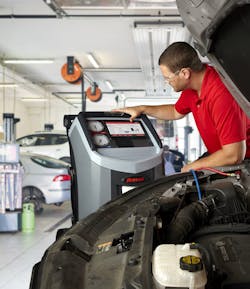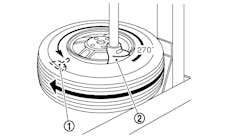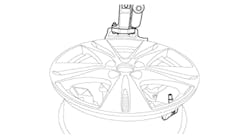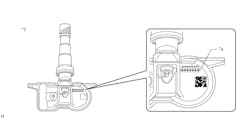As the calendar turns toward the warmer months, consumers are more likely to experience problems with the air conditioning systems in their vehicles. Before the busy season hits, let’s review some best practices.
MTD turned to experts from Bosch Automotive Service Solutions Inc. and Denso Products and Services Americas Inc. for advice. They offered tips for tire dealers, managers, service advisors and the technicians performing the work.
Time to certify
Justin Fisette is a product marketing manager for Bosch who says “the big topic” in A/C repair surrounds the ongoing switch to R-1234yf refrigerant. Fisette says eight of the 10 top-selling vehicles in 2019 used R-1234yf. (The holdouts: the 2019 Nissan Rogue and 2019 Toyota Corolla.)
Fisette says it’s essential that technicians are Section 609-certified, meaning they have taken a 90-minute class and passed the test to properly handle R-1234yf refrigerant. It’s a one-time certification from the U.S. Environmental Protection Agency, and it costs about $25.
“It’s a really minor investment that can save a shop a lot of time and heartache and money,” he says. There’s a steep fine for doing the work without the certification, and certification also ensures that stores can buy the refrigerant in bulk.
As for equipment, Fisette says the switch to R-1234yf has brought about a new style of A/C machines that identify refrigerants and detect leaks to sniff out R-1234yf and R-134a. “The machine puts a 15% charge in the vehicle system and instructs the technician to go underneath the center vent in the cab of the vehicle and check for leaks.” Older leak detectors might not detect the newer refrigerant.
The new leak detectors offer two benefits, Fisette says. The first comes in refrigerant cost savings, as R-1234yf is more expensive than R-134a. Detecting the leak can save a shop from putting $100 to $200 worth of refrigerant in a system, only to have it leak.
The second benefit boils down to safety, says Fisette. Even though R-1234yf isn’t combustible, it is mildly flammable. Finding the leak keeps refrigerant from seeping into the vehicle’s interior.
Detecting a leak has added time to the typical A/C service job, as has an extra vacuum stage, and Fisette says tire dealers need to account for that. A R-134a service would normally take 20 to 30 minutes. With R-1234yf, it’s a 40- to 50-minute job. Dealers need to think about labor rates for consumers, pay for technicians, and how much time is scheduled for every A/C repair.
The change in refrigerant also has led Bosch to introduce a tracer gas leak detector. The tracer gas is made of 95% nitrogen and 5% hydrogen. It’s better for the environment, and stores don’t have to charge so much to find a leak, says Fisette.
Listen to the customer
Steve Fett supervises Denso’s customer care technical group, and he also supports the company’s technical hotline. He says the service writer plays a key role in performing A/C repair jobs well.
“They really need to listen to what the customer is saying,” says Fett. “You can get a lot of information out of that person. Is there a noise? When did it start not working? In a lot of cases, the end user comes in and says, ‘I need a compressor.’ They don’t know what they need.”
Once the vehicle is in the bay, Fett says technicians need to focus on three things.
Lubrication: Technicians need to know exactly how much oil is in the compressor. Fett says having too much, not enough, or contaminated oil are all problematic.
If the compressor in a Mercedes has four ounces of oil in it, Fett knows the Mercedes replacement compressors come with four ounces of oil, too. But there’s also oil remaining in other components, perhaps another two ounces. That means the whole system now has six ounces, but only needs four. “It’s very possible you will shorten the life and have a premature failure of a compressor. Sometimes it can happen in 20 minutes. The compressor doesn’t like having liquid to compress. You have to do the math.”
Denso has published a chart with the oil contained in each of its compressors. Look for A/C compressors on Denso’s website.
Refrigerant ID: Whether technicians use their charging machine or a handheld tool, Fett says correctly identifying the refrigerant in a vehicle is important to keeping the shop’s A/C machine free of contamination. If the refrigerant shows it’s 50% air, it also helps a technician know there’s a leak. He recommends adding a $1 “refrigerant identification” fee onto A/C repair tickets to recoup the minimal costs.
Flush or replace: Technicians often replace the compressor and are compelled to flush the system. Fett says as condensers have gotten smaller, so have the tubes. If there’s a compressor failure and the condenser hesitates, he recommends replacing the condenser over flushing it.
“The condenser can get clogged easily. Flushing doesn’t work in many cases. If there’s a question of is it going to work, always go on the side of replacing it.” ■




